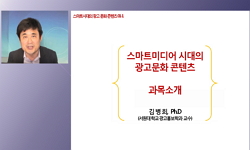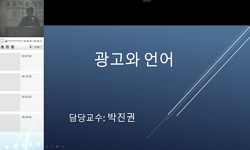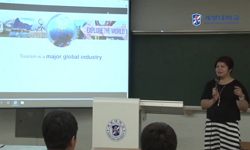Effective advertising can help managers attract tourists to their businesses. This study examined whether matching advertising contents and language with tourists’ travel motivation would have positive impacts on tourists’ responses toward adverti...
http://chineseinput.net/에서 pinyin(병음)방식으로 중국어를 변환할 수 있습니다.
변환된 중국어를 복사하여 사용하시면 됩니다.
- 中文 을 입력하시려면 zhongwen을 입력하시고 space를누르시면됩니다.
- 北京 을 입력하시려면 beijing을 입력하시고 space를 누르시면 됩니다.

Designing effective advertising by matching advertising contents and language with tourists’ travel motivation
한글로보기부가정보
다국어 초록 (Multilingual Abstract)
Effective advertising can help managers attract tourists to their businesses. This study examined whether matching advertising contents and language with tourists’ travel motivation would have positive impacts on tourists’ responses toward advertising through two consecutive between-subject design experiments. Both hedonic travel motivation and utilitarian travel motivation scenarios are designed. Then, two advertisements are designed for each experiment: affective advertising contents vs. cognitive advertising contents and assertive advertising language vs. suggestive advertising language. The findings demonstrate that respondents with utilitarian travel motivation showed more positive attitudes and behavioral intentions toward affective advertising contents than cognitive advertising contents. They also showed stronger behavioral intentions toward suggestive advertising language than assertive advertising language. In contrast, respondents with utilitarian travel motivation showed no different responses, between affective advertising contents and cognitive advertising contents, and likewise between suggestive advertising language and assertive advertising language. The findings imply that advertising contents and language can make significant impacts on tourists’ responses especially for tourists whose travel motivation is utilitarian. Thus, managers of local businesses should design different advertising to target local consumers and tourists. This study further implies that advertising can be managed to be more effective by matching its components with diverse aspects of destination and tourism.
참고문헌 (Reference)
1 Mayer, N. D., "“Think” versus “Feel”framing effects in persuasion" 36 (36): 443-454, 2010
2 Kronrod, A., "Wii will rock you! the use and effect of figurative language in consumer reviews of hedonic and utilitarian consumption" 40 (40): 726-739, 2013
3 Williams, P., "Value, satisfaction and behavioral intentions in an adventure tourism context" 36 (36): 413-438, 2009
4 Gallarza, M. G., "Value dimensions, perceived value, satisfaction and loyalty : an investigation of university students' travel behaviour" 27 (27): 437-452, 2006
5 Jang, S., "Travel motivations and destination choice : A study of British outbound market" 13 (13): 111-133, 2002
6 Fabrigar, L. R., "The role of the affective and cognitive bases of attitudes in susceptibility to affectively and cognitively based persuasion" 25 (25): 363-381, 1999
7 Duman, T., "The role of affective factors on perceived cruise vacation value" 26 (26): 311-323, 2005
8 Botti, S., "The locus of choice : Personal causality and satisfaction with hedonic and utilitarian decisions" 37 (37): 1065-1078, 2011
9 Kim, S. S., "The influence of a TV drama on visitors’ perception : A cross-cultural study" 31 (31): 536-562, 2014
10 Mattila, A. S., "The impact of service failures on customer loyalty : the moderating role of affective commitment" 15 (15): 134-149, 2004
1 Mayer, N. D., "“Think” versus “Feel”framing effects in persuasion" 36 (36): 443-454, 2010
2 Kronrod, A., "Wii will rock you! the use and effect of figurative language in consumer reviews of hedonic and utilitarian consumption" 40 (40): 726-739, 2013
3 Williams, P., "Value, satisfaction and behavioral intentions in an adventure tourism context" 36 (36): 413-438, 2009
4 Gallarza, M. G., "Value dimensions, perceived value, satisfaction and loyalty : an investigation of university students' travel behaviour" 27 (27): 437-452, 2006
5 Jang, S., "Travel motivations and destination choice : A study of British outbound market" 13 (13): 111-133, 2002
6 Fabrigar, L. R., "The role of the affective and cognitive bases of attitudes in susceptibility to affectively and cognitively based persuasion" 25 (25): 363-381, 1999
7 Duman, T., "The role of affective factors on perceived cruise vacation value" 26 (26): 311-323, 2005
8 Botti, S., "The locus of choice : Personal causality and satisfaction with hedonic and utilitarian decisions" 37 (37): 1065-1078, 2011
9 Kim, S. S., "The influence of a TV drama on visitors’ perception : A cross-cultural study" 31 (31): 536-562, 2014
10 Mattila, A. S., "The impact of service failures on customer loyalty : the moderating role of affective commitment" 15 (15): 134-149, 2004
11 Wu, L., "The impact of language style on consumers′ reactions to online reviews" 59 : 590-596, 2017
12 Levine, T., "The effects of power and message variables on compliance" 68 (68): 28-48, 2001
13 Hirschman, E. C., "The effect of verbal and pictorial advertising stimuli on aesthetic, utilitarian and familiarity perceptions" 15 (15): 27-34, 1986
14 Chaudhuri, A., "The effect of hedonic and utilitarian verbal descriptions and pictures on willingness to try an innovation: Do emotions matter?" 1-18, 2012
15 Sinclair, R. C., "The construction of social judgments" Erlbaum 165-193, 1992
16 Chaudhuri, A., "The chain of effects from brand trust and brand affect to brand performance : The role of brand loyalty" 65 (65): 81-93, 2001
17 Sanders, R. E., "The actual practice of compliance seeking" 11 (11): 263-289, 2001
18 Becker, S. L., "Research on emotional and logical proofs" 28 (28): 198-207, 1963
19 Ryu, K., "Relationships among hedonic and utilitarian values, satisfaction and behavioral intentions in the fast-casual restaurant industry" 22 (22): 416-432, 2010
20 Moliner, M. A., "Relationship quality with a travel agency: The influence of the postpurchase perceived value of a tourism package" 7 (7): 194-211, 2007
21 Knepprath, E., "Reasoned discourse and motive appeals in selected political speeches" 51 (51): 152-156, 1965
22 Fitzsimons, G. J., "Reactance to recommendations : When unsolicited advice yields contrary responses" 23 (23): 82-94, 2004
23 Lam, T., "Predicting behavioral intention of choosing a travel destination" 27 (27): 589-599, 2006
24 Levinson, P., "Politeness: Some universals in language usage (Vol. 4)" Cambridge university press 1987
25 Byun, J., "Open kitchen vs closed kitchen: Does kitchen design affect customers’ causal attributions of the blame for service failures?" 30 (30): 2214-2229, 2018
26 Dillard, J. P., "On the nature of reactance and its role in persuasive health communication" 72 (72): 144-168, 2005
27 Forgas, J. P., "On feeling good and being rude : Affective influences on language use and request formulations" 76 (76): 928-, 1999
28 Snepenger, D., "Normative meanings of experiences for a spectrum of tourism places" 43 (43): 108-117, 2004
29 Lord, K. R., "Motivating recycling behavior : A quasiexperimental investigation of message and source strategies" 11 (11): 341-358, 1994
30 Forgas, J. P., "Mood and judgment : the affect infusion model(AIM)" 117 (117): 39-, 1995
31 Fodness, D., "Measuring tourist motivation" 21 (21): 555-581, 1994
32 Pratt, S., "Measuring the effectiveness of destination marketing campaigns : Comparative analysis of conversion studies" 49 (49): 179-190, 2010
33 Wilson, S. R., "Identity implications of influence goals : Similarities in perceived face threats and facework across sex and close relationships" 19 (19): 195-221, 2000
34 Beukeboom, C., "How mood turns on language" 42 (42): 553-566, 2006
35 Kim, S., "How are food value video clips effective in promoting food tourism? Generation Y versus non–Generation Y" 35 (35): 377-393, 2018
36 Quick, B. L., "Further evidence that psychological reactance can be modeled as a combination of anger and negative cognitions" 34 (34): 255-276, 2007
37 Quick, B. L., "Examining the use of forceful language when designing exercise persuasive messages for adults : A test of conceptualizing reactance arousal as a two-step process" 23 (23): 483-491, 2008
38 Kronrod, A., "Enjoy! Hedonic consumption and compliance with assertive messages" 39 (39): 51-61, 2012
39 Bloch, C., "Emotions and discourse" 16 (16): 323-342, 1996
40 Byun, J., "Effective destination advertising : Matching effect between advertising language and destination type" 50 : 31-40, 2015
41 Lewis, M., "Customer relationship stage and the use of picture-dominant versus text-dominant advertising : A field study" 89 (89): 263-280, 2013
42 Wirtz, J., "Consumer responses to compensation, speed of recovery and apology after a service failure" 15 (15): 150-166, 2004
43 Kim, S., "Comparison of destination brand equity models of competitive convention cities in East Asia" 2016
44 Smith, A. K., "An experimental investigation of customer reactions to service failure and recovery encounters paradox or peril?" 1 (1): 65-81, 1998
45 Williams, P., "Age‐related differences in responses to emotional advertisements" 32 (32): 343-354, 2005
46 Drolet, A., "Age-related differences in responses to affective vs. rational ads for hedonic vs. utilitarian products" 18 (18): 211-221, 2007
47 Seddighi, H. R., "A model of tourism destination choice : a theoretical and empirical analysis" 23 (23): 475-487, 2002
48 Wang, S., "A comparative study of perceptions of destination advertising according to message appeal and endorsement type" 23 (23): 24-41, 2018
동일학술지(권/호) 다른 논문
-
The good, the bad, and the ugly
- 한국관광연구학회
- Kai-Sean Lee
- 2018
- KCI등재
-
Tourists’ decision-making process under the threat of smog
- 한국관광연구학회
- WenJia Ruan
- 2018
- KCI등재
-
Comparisons of travel characteristics between participants and nonparticipants in overseas travel
- 한국관광연구학회
- Heung-Ryel Kim
- 2018
- KCI등재
-
Issues and trends in the hospitality and tourism industry INTRODUCTION etc.
- 한국관광연구학회
- 편집부(편집자)
- 2018
- KCI등재
분석정보
인용정보 인용지수 설명보기
학술지 이력
| 연월일 | 이력구분 | 이력상세 | 등재구분 |
|---|---|---|---|
| 2026 | 평가예정 | 재인증평가 신청대상 (재인증) | |
| 2020-01-01 | 평가 | 등재학술지 유지 (재인증) |  |
| 2017-01-01 | 평가 | 등재학술지 유지 (계속평가) |  |
| 2014-01-28 | 학술지명변경 | 외국어명 : Korea Journal of Tourism and Hospitality Research -> International Journal of Tourism and Hospitality Research |  |
| 2013-01-01 | 평가 | 등재학술지 유지 (등재유지) |  |
| 2010-01-01 | 평가 | 등재학술지 선정 (등재후보2차) |  |
| 2009-01-01 | 평가 | 등재후보 1차 PASS (등재후보1차) |  |
| 2008-01-01 | 평가 | 신청제한 (등재후보1차) |  |
| 2007-12-25 | 학술지명변경 | 외국어명 : 미등록 -> Korea Journal of Tourism and Hospitality Research |  |
| 2007-01-01 | 평가 | 등재후보학술지 유지 (등재후보2차) |  |
| 2006-03-29 | 학술지등록 | 한글명 : 관광연구저널외국어명 : 미등록 |  |
| 2006-01-01 | 평가 | 등재후보 1차 PASS (등재후보1차) |  |
| 2004-01-01 | 평가 | 등재후보학술지 선정 (신규평가) |  |
학술지 인용정보
| 기준연도 | WOS-KCI 통합IF(2년) | KCIF(2년) | KCIF(3년) |
|---|---|---|---|
| 2016 | 1.95 | 1.95 | 1.84 |
| KCIF(4년) | KCIF(5년) | 중심성지수(3년) | 즉시성지수 |
| 1.82 | 1.8 | 2.18 | 0.68 |





 KCI
KCI




